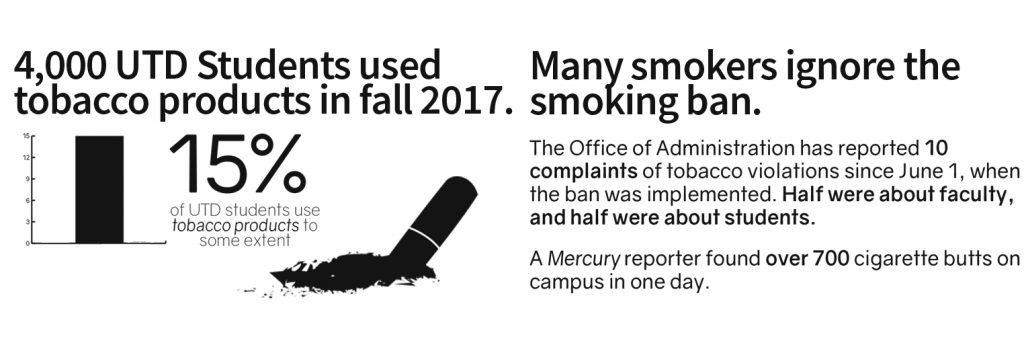Editor’s Note: Joseph’s identity was kept anonymous so he could speak freely about colleagues who reguarly violate the tobacco ban.
A UTD policy aimed at ending the use of tobacco products on campus was met with mixed reactions from students and faculty. Since “Breathe Easy” went into effect, tobacco use on campus remains prevalent, but hidden.
The Mercury collected over 700 cigarette butts on Nov. 11, 2017 and 542 more on Jan. 21 from the areas around the Administration building, the Jonsson Academic Center, Parking Structure 3, Residence Hall Northwest and the Erik Jonsson School of Engineering and Computer Science.
UTD’s National Collegiate Health Assessment survey found that 15 percent, about 4,000 students, used tobacco products sparingly in fall 2017. Since the policy was put into place on June 1, a total of 15 students, faculty and staff members have sought out cessation services from university resources.
Joseph, an arts and humanities graduate, lives with asthma and said the policy hasn’t been very effective.
“When President Benson announced the smoking ban on campus, I was so happy,” Joseph said. “But I noticed that things didn’t really change. There are a bunch of smokers who like to use Jonsson as a place to smoke outside, and really all they did was go from being right in front of the doors to around the corner.”

Joseph said he often sees at least one smoker per day in the campus parking lots, and has had asthma attacks as a result of both cigarette smoke and steam from vape pens.
“If I’m around smoking and I start breathing it in, I have a reaction. I have asthma, so it becomes harder to breathe,” Joseph said. “When they used to have smoking on campus … I would have to hold my breath and go through that crowd of people into the building.”
The tobacco-free policy relies on community enforcement, so if any students or faculty members see someone smoking or vaping on campus, it becomes their responsibility to stop the individual. Policy violations can be reported to the Office of Administration, with repeat violations resulting in disciplinary action. Administration reported that students and faculty made 10 complaints about violations of the tobacco policy since it was put in place. Five of those complaints were about students, while the other half were about faculty.
“There might be people that I come into contact with in my daily routine at UTD, either student-to-employee or employee-to-employee, and I have concerns about retribution if I complain that you’re doing something wrong, or shouldn’t be smoking,” Joseph said. “There are concerns about that when you share a building with other people.”
In contrast, finance senior Jeremiah Smith said he preferred the school’s old policy, prohibiting the use of tobacco products within 33 feet of buildings, and the tobacco-free policy disrupts his schedule by forcing him to leave campus property in order to smoke. In response to the new policy, Smith filed a petition with Student Government proposing a more gradual transition to a tobacco-free campus through the use of designated smoking areas. UT Austin used this approach during its transition to being tobacco-free.
“As I proposed in the petition, what I would do is have designated areas with posted signs encouraging people there to seek medical help and kick the habit,” Smith said.
His petition hasn’t gained enough traction to be addressed by SG, but he isn’t alone in his sentiment. Information and technology systems senior Austin Albright began vaping as a way to quit smoking, and said while the new policy has decreased smoking on campus, he continues to see smokers and vapers on a daily basis.
“I don’t think it’s going to reduce people’s usage, I think they’re just going to do it in low-key places,” Albright said. “In the future, I see more people trying to evade the policy than adhere to it.”

UT Arlington is also tobacco free, and its campus police department conducts “Smoke Patrols” in areas with a high number of complaints about smokers. The UTA police can issue referrals to students and faculty caught smoking, requiring the offenders to go through campus administration. Joseph said he would like to see more enforcement of the tobacco-free policy at UTD.
“I think the university, when they made the ban, had some good ideas,” Joseph said. “But if you’re going to have a policy, if you’re going to put up signs, is it just for show?”
The school currently offers cessation services through the Center for Students in Recovery, while the Student Wellness Center offers tobacco education programming and resources to students. UTD also offers the UT SELECT health plan to employees. The plan costs $30 per tobacco user per month and includes counseling, pharmaceutical therapy and nicotine replacement therapy. In an email statement to The Mercury, Vice President for Administration Calvin Jamison said the policy is meant to improve the health of the UTD community.
“Our goal is to create a healthier campus community,” Jamison said. “We are focused on changing behaviors by educating the campus about the benefits of being tobacco-free and providing supportive avenues toward cessation as an option.”
Assistant Director of Communications Chase York said in an email to The Mercury that in the eight months since the policy took effect, there has been a significant decrease in smoking on campus. A survey has yet to be conducted to determine the efficacy of the ban, and no concrete data has been collected.
“At present, there are no plans to amend the policy,” York said. “There are some growing pains associated with this type of transition, but it seems to be going well.”
Joseph said he appreciates not having to walk through a cloud of smoke, and the campus is better overall thanks to the policy. He added that while these improvements have helped, the policy is still insufficient.
“I think what bothers me is the disconnect between what UTD as a school is showing me … versus the reality,” he said.
Leave a Reply